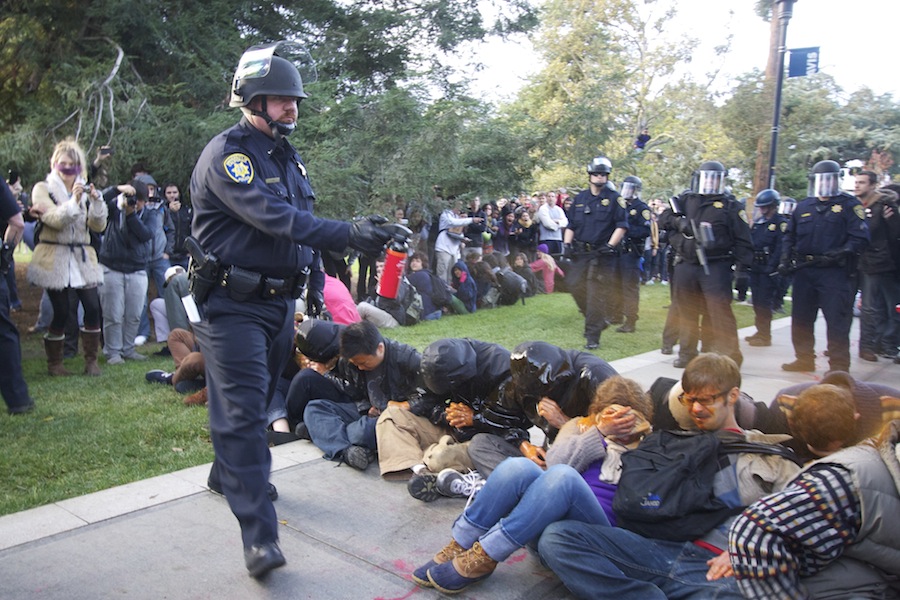
UC Davis nearly doubles strategic communications budget following string of negative incidences against the university’s image
According to documents obtained by the Sacramento Bee, UC Davis spent at least $175,000 trying to repair its image following an incident in Nov. 2011 in which a campus police officer pepper-sprayed student protesters on the Quad.
The aggressive public relations campaign sought to rehabilitate the university’s public image through primarily erasing mentions of the pepper-spray incident and Chancellor Linda P.B. Katehi on online search engines, according to the documents.
The documents revealed that in Jan. 2013, UC Davis signed a deal with Nevins & Associates, a Maryland-based public relations firm, for a six-month long contract. The contract, which paid Nevins $15,000 a month, was signed with the objective “to expedite the eradication of references to the pepper spray incident in search results on Google for the university and the Chancellor.”
“Nevins & Associates is prepared to create and execute an online branding campaign designed to clean up the negative attention the University of California, Davis, and Chancellor Katehi have received related to the events that transpired in November 2011,” the six-page proposal read. “Online evidence and the venomous rhetoric about UC Davis and the Chancellor are being filtered through the 24-hour news cycle, but it is at a tepid pace.”
The documents showed that the university paid Nevins $92,970.73 through July 2013 for the campaign, which included lodging and travel costs for a firm associate.
“The fact that my university, where I receive no financial aid and must pay for out-of-pocket, so easily spent hundreds of thousands of dollars to cover the tracks of their horrendous mistake years ago [is terrible],” said third-year computer science major Pooja Rajkumar. “I have absolutely no faith in our school’s administration, and I am ashamed to call this my university.”
The proposal also noted promoting positive UC Davis-relevant stories.
“Communicating the value of UC Davis is an essential element of our campus’s education, research, and larger public service mission,” said Dana Topousis, UC Davis’ executive director of news and media relations. “As part of this overall communications strategy, it is important that the excellent work underway at UC Davis with respect to educating the next generation of students, pursuing groundbreaking research, and providing important services to the State is not lost during a campus crisis, including the crisis that ensued following the extremely regrettable incident when police pepper-sprayed student protesters in 2011.”
In June 2014, nearly a year after UC Davis’ contract ended with Nevins, the university signed a new consulting deal with ID Media Partners in Sacramento.
The firm, whose business title is IDMLOCO, was signed on for an $82,500 contract “to achieve a reasonable balance of positive natural search results on common terms concerning UC Davis and Chancellor Katehi” through “a comprehensive search engine results management strategy.”
UC Davis signed additional contracts with IDMLOCO in Feb. 2015, for $8,000 a month, and Sept. 2015, for $22,500 a month, to redevelop UC Davis’ social media and redesign the university’s strategic communications department, respectively.
In March 2016, the university received further backlash after news was released that Katehi was hired for seats on the boards of two for-profit corporations, Devry Education Group and John Wiley & Sons. Topousis confirmed that UC Davis has hired one outside consultant since March 1 to work on the university’s image.
Following Katehi’s inauguration as chancellor in 2009, the UC Davis strategic communications budget rose exponentially from $2.93 million in 2009 to $5.47 million in 2015. According to Topousis, the funds to pay consultants came out of the university’s strategic communications department’s budget.
“When students at our campus struggle to pay tuition and go without meals in their pursuit of a higher education it is unacceptable for the administration to spend money in an attempt to cover up their mistakes,” said ASUCD President Alex Lee.”These are thousands of dollars in student fees that could have been prioritized in fixing its flaws instead of hiding its blemishes.”
Written by: Jason Pham and Alyssa Vandenberg – campus@theaggie.org









